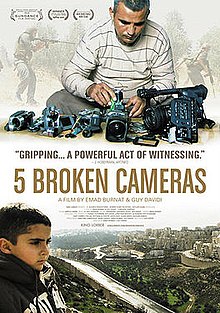5 Broken Cameras
| 5 Broken Cameras | |
|---|---|
 |
|
| Directed by |
|
| Produced by |
|
| Written by |
|
| Music by | Le Trio Joubran |
| Cinematography | Emad Burnat |
| Edited by |
|
| Distributed by | Kino Lorber |
|
Release date
|
|
|
Running time
|
90 minutes |
| Country |
State of Palestine Israel France |
| Language |
|
| Box office | $108,541 (USA) (15 February 2013)) |
5 Broken Cameras (Arabic: خمس كاميرات محطمة Khamas Kamīrāt Muḥaṭṭamah; Hebrew: חמש מצלמות שבורות Hamesh Matslemot Shvurot) is a 94-minute documentary film co-directed by Palestinian Emad Burnat and Israeli Guy Davidi. It was shown at film festivals in 2011 and placed in general release by Kino Lorber in 2012. 5 Broken Cameras is a first-hand account of protests in Bil'in, a West Bank village affected by the Israeli West Bank barrier. The documentary was shot almost entirely by Palestinian farmer Emad Burnat, who bought his first camera in 2005 to record the birth of his youngest son. In 2009 Israeli co-director Guy Davidi joined the project. Structured around the destruction of Burnat's cameras, the filmmakers' collaboration follows one family's evolution over five years of turmoil. The film won a 2012 Sundance Film Festival award, it won the Golden Apricot at the 2012 Yerevan International Film Festival, Armenia, for Best Documentary Film, won the 2013 International Emmy Award, and was nominated for a 2013 Academy Award.
There are five cameras — each with its own story. When his fourth son, Gibreel, is born in 2005, self-taught cameraman Emad Burnat, a Palestinian villager, gets his first camera. At the same time in his village of Bil’in, the Israelis begin bulldozing village olive groves to build a barrier to separate Bil'in from the Jewish Settlement Modi'in Illit. The barrier's route cuts off 60% of Bil'in farmland and the villagers resist this seizure of more of their land by the settlers.
During the next year, Burnat films this struggle, which is led by two of his best friends including his brother Iyad, while at the same time recording the growth of his son. Very soon, these events begin to affect his family and his own life. Emad films the Army and Police beating and arresting villagers and activists who come to support them. Settlers destroy Palestinian olive trees and attack Burnat when he tries to film them. The Army raids the village in the middle of the night to arrest children. He, his friends, and brothers are arrested or shot; some are killed. Each camera used to document these events is shot or smashed.
...
Wikipedia
